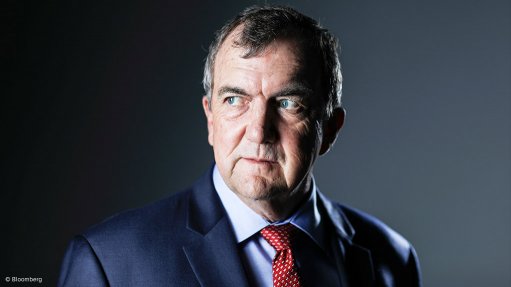
Barrick Gold president and CEO Mark Bristow
Photo by: Bloomberg
The Kibali gold mine – ranked among the world’s top ten gold mines – has “made a strong start” to this year after having set a new production record in 2018, Barrick Gold president and CEO Mark Bristow says.
Bristow says the mine, which is a joint venture with AngloGold Ashanti and Democratic Republic of Congo (DRC) parastatal Sokimo, has continued to break records en route to its 2019 guidance of producing 750 000 oz – the latest being the 285 000 t of ore hoisted through the shaft in March.
Throughput and recovery remains at or above nameplate levels and Kibali continues to add new technology to its autonomous mining operation.
Bristow notes that Barrick is intensifying its focus on reserve and resource replacement, owing to Kibali’s amplified production rate.
“Drilling is targeting the extensions of the KCD Gorumbwa complex of orebodies along the 30 km gold-bearing KZ structure and the western extensions of the Kibali Graben. This has confirmed that there is a substantial potential for replenishing the reserve and resource base,” Bristow says.
He adds that Kibali is one of five tier one gold mines in the Barrick stable and that it is an “outstanding example” of Barrick’s commitment to partnerships, demonstrated by the constructive relationship between its three shareholders, as well as by its continuing investment in the local economy.
“During the past quarter, the mine spent $38-million with Congolese contractors and the recently initiated Durba road upgrade project is being undertaken by 100% Congolese owned and operated contractors which Kibali developed.”
Bristow also cites the meeting held in Washington DC, in the US, earlier this month, at which Congolese President Felix Tshisekedi and Barrick executive chairperson John Thornton confirmed their joint commitment to developing the country’s gold mining industry.
“The DRC government is one of our most important partners and we look forward to working with them to create an economic climate capable of attracting large and long-term investments such as the one we made in Kibali,” says Bristow.
He adds, however, that further and greater levels of investment require a mining code that “equitably balances the interests of the State and the capital providers” enabling both to participate in value creation.
As such, he emphasises Barrick’s continued engagement with the government and administration on “issues” pertaining to the mining code introduced in the DRC last year.